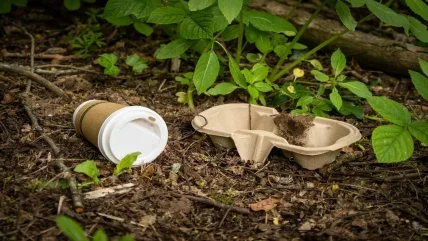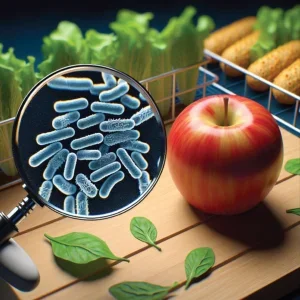
We live in challenging times; one where volatility and uncertainty feel like the prevailing trends. Food and energy prices are rising, inflation and living costs are soaring, the world’s superpowers are facing against each other in war in Europe and the possibility of a recession looms large in many developed nations. At the very least, economic growth is slowing down, even in the economic powerhouse that is China. With macroeconomic headwinds growing stronger, companies in many industries are moving their focus to short-term issues. Profitability or even survival currently occupy the top spots on the corporate agenda, pushing long-term concerns to one side. Sustainability, which has been a topic riding a rising tide for so long, could lose out in this battle to balance priorities. New research shows that in the food industry, which has been the epicentre for intensive decarbonisation efforts for many years, economic upheaval is derailing efforts to improve sustainability.
The research – a survey of food and beverage managers, directors and business owners conducted by the food processing and packaging solutions powerhouse Tetra Pak – shows 93% of respondents admit that the current socio-economic climate means sustainability is no longer a priority. More than one third (36%) believe other factors will take the lead in the next 12–24 months, even though more than two-thirds of consumers (68%) highly value companies that take steps to provide recyclable packaging options for food and drink products.
“Both consumers and food and beverage businesses across the UK and Ireland are currently facing increased economic uncertainty, with numerous factors influencing decision making – both in the boardroom and on the shop floor,” says Alex Henriksen, managing director north Europe at Tetra Pak. “Within this context, we must ensure that the decarbonisation of our food system continues to be prioritised, and that industry and government are working together to facilitate a shift towards a circular economy.”
Measuring the mood of the market
For Tetra Pak, it is crucial to work alongside customers to ensure it plays a part in building a sustainable future. The survey was part of its attempt to ensure the industry has up-to-date insights on how consumers and businesses feel about the topic of sustainability.
93%
The percentage of food and beverage managers, directors and business owners who prioritise other issues over sustainability as a result of the current socioeconomic climate.
“Businesses report that the top hurdles preventing a full focus on sustainability include supply chain challenges and disruption, rising fuel and operational costs and the high investment in supporting technologies required to meet environmental goals,” Henriksen explains.
Indeed, some of the biggest costs of switching to new packaging stem from the necessary changes or investments needed to modify existing packaging machines. This means packaging that has been specifically developed to run on customers’ existing lines with limited or no modification could be a key way to minimise costs and disruption.
36%
The percentage of senior management in food and beverage who consider the pursuit of sustainable packaging as important.
Tetra Pak
“Because of this changing socio-economic climate, most of the polled organisations said they will need to prioritise issues other than sustainability, even though it is clear that this is not a path they want to take,” adds Henriksen. “Nevertheless, the appetite is clearly there for sustainability efforts, and we are confident that once organisations have adjusted to these changes, sustainability will once again be top priority.”
Recent surveys of grocery shoppers from six European countries conducted in 2020 and again in 2023 by Amcor – which develops and produces responsible packaging for food, beverage, pharmaceutical, medical, home and personal-care, and other products – shows sustainability is very much on the minds of consumers.
The data reveals a 16% increase over the three years in the number of people who rated climate change as their top environmental concern. Nevertheless, rising inflation means affordability remains a hurdle for many shoppers who want to shop sustainably.
“The current macroeconomic environment, combined with recent supply chain issues, has certainly caused many brands and their consumers to re-evaluate their priorities,” says Cassandra Biehler, who leads communications for Amcor Flexible business in EMEA. “Still, concern about climate change remains high among European consumers.”
“Most of our customers see improved packaging sustainability as a mission they’re on for the longterm,” she adds. “So, while current, short-term challenges may slow down some innovation projects, sustainability is not something they are setting aside, they remain committed to progress.”
Packaging is the key ingredient
In the food industry’s pursuit of sustainability, packaging plays a huge part. In fact, the packaging industry must play a leading role in the pursuit of a more sustainable food system, as plastic packaging accounts for nearly 70% of waste in the UK, according to climate action NGO WRAP.
There is, of course, a delicate balance to be reached between sustainability and food security. Food manufacturers need high-performance packaging that can deliver safe and nutritious food, which does not negatively impact the world’s limited resources.
“They must consider the carbon footprint of their products as part of the journey towards a circular economy – taking into account its full life cycle and including its packaging,” Henriksen says. “This involves carefully considering how the materials used in packaging are sourced, through to how consumers engage with the product and the recycling systems they are part of.”
Commitment and innovation among packaging companies is driven by a need to satisfy consumers’ growing demands for sustainability. Tetra Pak’s research shows consumers are well informed and passionate about sustainability, preferring to buy from companies that are reducing carbon emissions.
As a result, packaging companies continue to push the agenda through innovation. In 2023, Tetra Pak created a cap for beverage cartons using certified recycled polymers, and it is currently testing an industry-first fibre-based barrier to replace the aluminium layer in its packaging. It is also pioneering the use of plant-based, fully renewable materials in its cartons.
The Tetra Rex Plant-based carton is the world’s first fully renewable beverage carton. Amcor, too, continues to innovate. It is currently looking at light-weighting, reducing empty head space, using thinner materials, switching from heavy containers to pouches, and creating new materials. AmFiber SkinNova is a packaging concept for meat, poultry and seafood that uses the company’s SkinTite skin film with a flat cardboard base laminated to a high-barrier liner.
Furthermore, AmLite HeatFlex Recycle Ready is a mono-material pouch or lidding for heattreated retort applications such as ready meals, microwavable rice and wet pet food, is the first material to enable retort pouches made from mixedmaterial to be recycled. AmFiber Performance Paper is a high-barrier paper-based packaging available for confectionery products like chocolate bars, as well as culinary products like bouillon cubes and spices. AmPrima is a platform of recycle-ready mono-PE and mono-PP materials for bags, pouches, stickpacks, liddings and many other formats.
The packaging industry is certainly working hard to ensure food manufacturers have options available to pursue their sustainable goals, but establishing a circular economy requires more than packaging innovation. What is required is more engagement with society to create a strong recycling culture, with better education being fundamental to minimising waste.
Eyes on the horizon
Not all of the impetus for improvements can come from industry, instead, regulators have also been pushing for higher standards. For instance, the EU’s recently published proposal on the Packaging and Packaging Waste Regulations (PPWR) puts forward mandates for more sustainable packaging with requirements that all packaging put on the EU market is designed for recycling and proposes minimum percentages for post-consumer recycled material.
“Between the pull from consumers and the push from European regulators, the need to continue moving toward more sustainable packaging is clear,” says Biehler.
“Recycling is an essential part of a sustainable, circular economy, but it is only doable when the necessary infrastructure is available,” notes Henriksen. “This means government regulation has a role to play in facilitating how it should be done. In the UK, consistency of recycling and waste disposal policies and practices across local authorities would be a crucial step, allowing consumers, businesses and waste management organisations to work together as efficiently as possible.”
Tetra Pak is currently supporting a deposit return scheme to include cartons, extended producer responsibility and consistent household collection systems. It has also published a food systems report calling on the UK government to develop a framework for environmental labelling on food.
“The current macroeconomic environment, combined with recent supply chain issues, has certainly caused many brands and their consumers to re-evaluate their priorities. Still, concern about climate change remains high among European consumers.”
Cassandra Biehler
“Environmental labelling systems such as this would allow consumers to make informed decisions about the environmental impact of their food,” Henriksen explains. “With half of consumers now stating they would take into account a brand’s decarbonisation efforts or sustainability credentials when making a purchase, this regulation would make sustainability that much more accessible to the general public.”
70%
The percentage of senior management in food and beverage who believe we should be doing more to address sustainability issues.
Tetra Pak
Short-term financial matters may loom large for food producers, but they must remain focused on the long term, taking into account customers’ preferences and taking advantage of the many new sustainable packaging options that are available.
Certainly, both industry and cross-sector collaboration will be vital in order to achieve a circular economy, but the first step is for the industry to keep looking to the horizon and not down at its feet.






